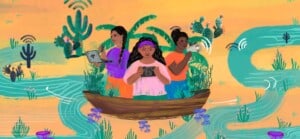
Ideas for the future: a resource for those interested in restoring information ecosystems in LAC
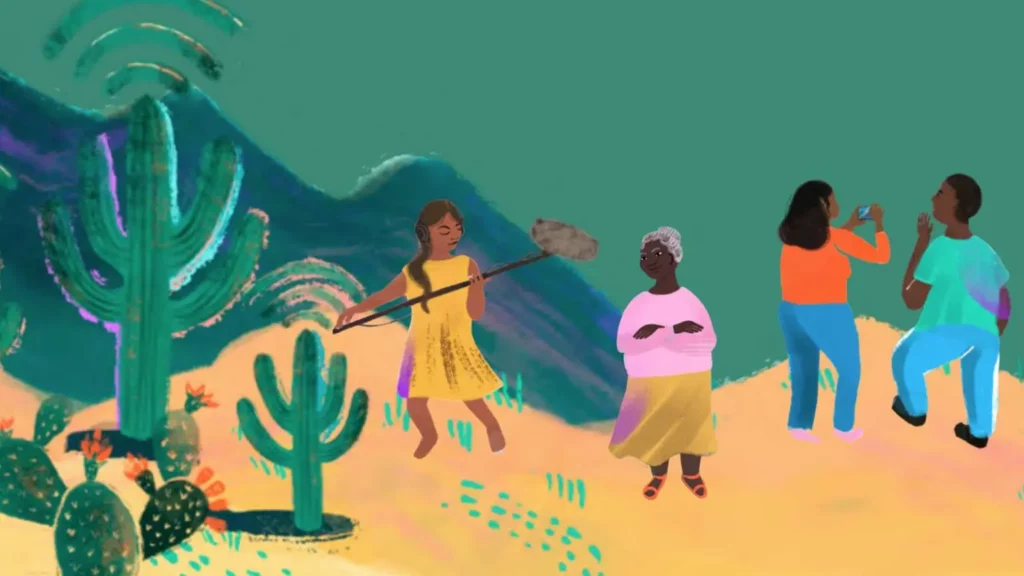
Author: Bárbara Paes
Back in 2023, The Engine Room started working on a project to contribute to building stronger, healthier information ecosystems in Latin America and the Caribbean (LAC). Supported by Open Society Foundations, we set out to figure out ways to support civil society organizations in navigating concerning trends related to digital technologies’ role in shaping information ecosystems in LAC – from political polarization, to information disorder, to digital surveillance, to attacks on media and journalists.
Since then, we looked into how civil society across these regions has been working to build more robust information ecosystems; facilitated numerous spaces for knowledge sharing across organizations from various countries; and provided hands-on tech and data support to dozens of groups working to restore information ecosystems.
After publishing the findings from the first phase of the project, we kept ourselves busy with a few things, including organizing a series of online events about restoring information ecosystems in LAC, hosting an in-person gathering in Santiago with journalists, activists and organizers; and preparing a new website with the findings, stories and collective visions documented throughout the project.
In this blog, I’m sharing some key takeaways from this meeting in Santiago, as well as more information about this new website.
Building alliances and materialising social justice through conversations: key takeaways from the gathering in Santiago
In November 2024, we spent three days in Santiago de Chile with journalists, activists and organizers from 10 countries in Latin America and the Caribbean. During our time there, we were immersed in conversations about the state of information ecosystems and how participants (and their organizations) are working to restore these ecosystems.
With the support of a team of interpreters who facilitated the exchange between Portuguese-speaking and Spanish-speaking participants, the group shared perspectives from what is happening in each of their contexts and insights from their own strategies; as well as collectively imagined other ways of working together towards healthier information ecosystems.
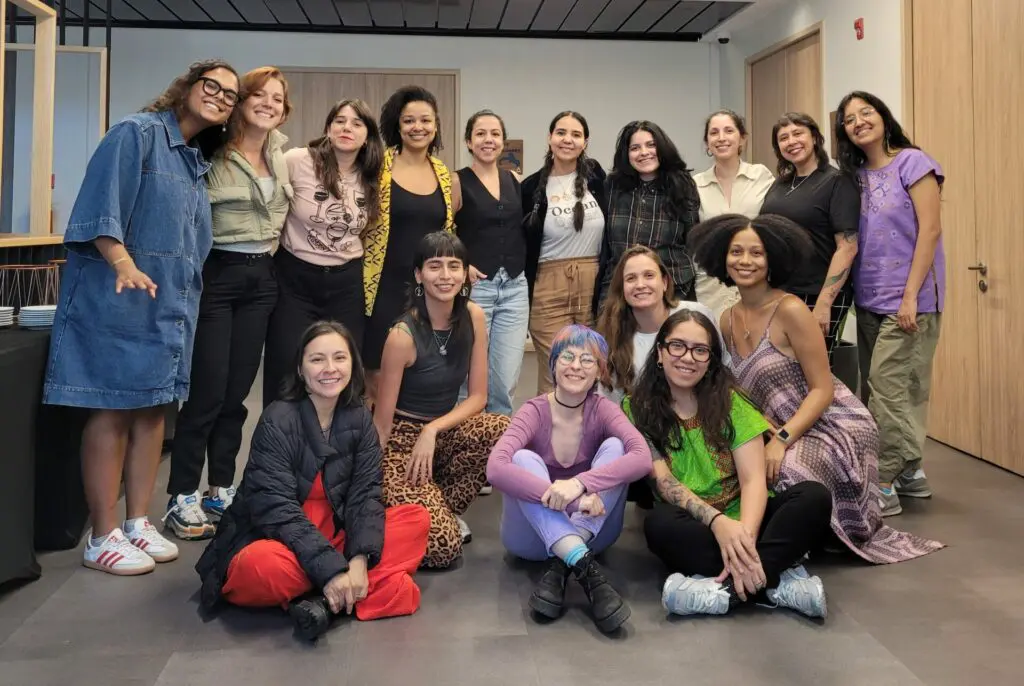
It was truly a privilege to be part of this gathering and learn from the amazing minds and praxis from those attending! Here are some of the takeaways from our conversation:
“Our survival is working together”: building alliances across movements, looking for ways of breaking political bubbles
A dire funding landscape, the rise of authoritarian tendencies in many countries, excessive platformization of communications and media landscapes. “In this context, how can we sustain our work?”. Questions around the sustainability of organizations working for stronger information ecosystems permeated much of our gathering.
Thinking about civil society’s survival in light of all these challenges can certainly be difficult. But for the group that came together in Santiago, imagining ways of building strong alliances across movements and looking for strategies for collaboration against some of these very complex challenges emerged as a potential “way out”.
The zine below, produced by a group during a workshop facilitated by Hambre Hambre Hambre in our gathering in Santiago, emphasizes the power of creative methodologies combined with humour and strategic alliances across movements. The “recipe book” highlights how community listening, imagination and narrative experimentation, collective care, together with hope, diversity, an effort to break bubbles and building more alliances with other “cooks” can make up strong strategies for shifting information ecosystems.
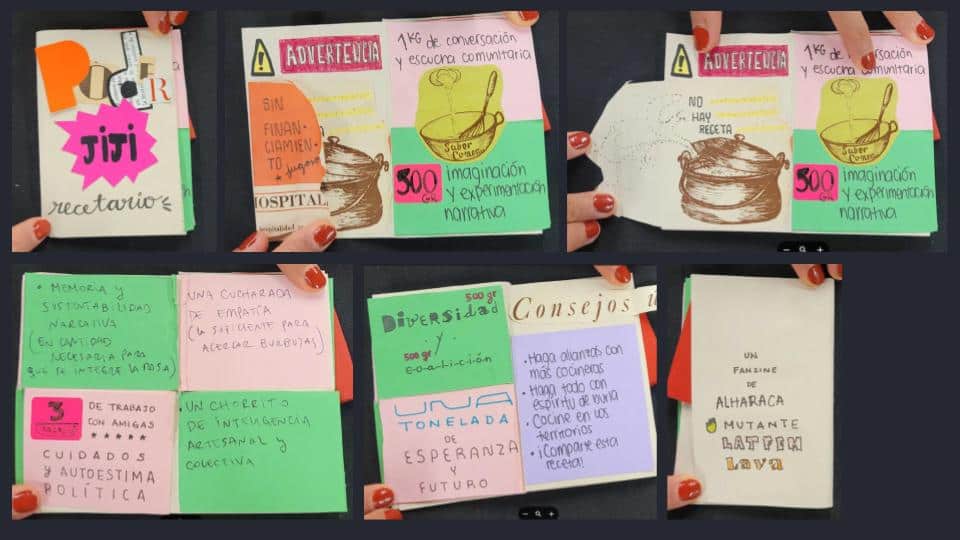
Unbalanced information ecosystems harm our ability to communicate with each other, prioritising meaningful conversations can be an antidote
Through the gathering there was this overall perception that, in order to make socially just information ecosystems a reality, we need to work to reconstruct and amplify people’s abilities to have meaningful conversations. This idea of “meaningful conversations” also showed up in the research we published in August 2024 and, at the time, organizations like Mutante, Baudó Agencia Pública, Quid, Mullu TV and Latfem significantly inspired how we think about this term.
In Santiago, we’ve heard from these and other organizations who attended about how they’re working to craft reporting and build space for conversations in partnership with their audiences/their communities with the goal of amplifying the spaces we have for conversation. Considering the dynamics of attention economy, platformization and extreme polarization in the region, there was a general consensus that we need to create spaces that allow (and make it easy!) for people to engage in conversation with each other, that allow for “breaking the ideological bubbles”, that make room for diverse perspectives. And for that to happen – there needs to be robust funding flowing towards these organizations.
This idea can be illustrated by this zine, put together by participants during the workshop facilitated by Hambre Hambre Hambre:
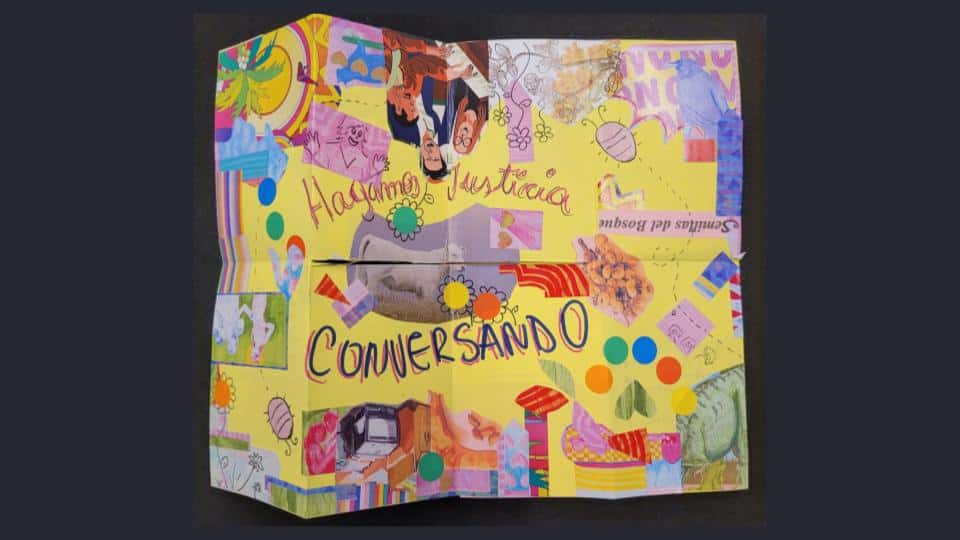
Sharing learning about how various organizations are tackling the challenges they face can lead to a stronger ecosystem
Right from the beginning of our gathering, we spoke a lot about how there are so many similarities in terms of the challenges that we’re facing in information ecosystems in Latin America and the Caribbean: from the shared, complex legacies of colonization and authoritarianism in multiple countries in the region, to the historical injustices in terms of access to technology and communication, combined with more recent phenomena like platformization and the effects of the attention economy. With that said, though there are similarities in how our information ecosystems are facing disequilibrium, the group talked about how we can’t overlook the instances where these challenges express themselves in different ways according to local contexts, languages, etc.
Keeping in mind the contextual differences, while still recognizing common denominators between our challenges can actually make our work stronger. It means acknowledging that there are many shared root causes for the disequilibrium we see in our information ecosystems and also recognising that though they show up in very similar ways a lot of the time, their repercussions might look a little different in each context.
At the same time, there is so much that can be learned from learning about how different organizations are working to address similar challenges. Though simply transplanting strategies without considering the context won’t necessarily work, it can inspire, open up possibilities and highlight potential roads to be taken. In Santiago, as we listened to how each organization is rolling out various experiments, strategies and methodologies, we were reminded of how, ultimately, to restore information ecosystems, we need a myriad of strategies that holistically address the various informational needs of people in different contexts. Learning from each others’ experiments can help us get there.
And in the spirit of sharing learnings intentionally: The Engine Room is launching this new website!
Developed by sustainable WordPress agency WholeGrain Digital, this new website dedicated to our work on restoration of information ecosystems houses:
- An overview of the findings from our research and an exploration of strategies that have already been implemented by civil society in the region.
- An evolving picture of what healthy, robust information ecosystems would look like for Latin America and the Caribbean, and the collective hopes, ideas and non-negotiable elements we envision as part of information ecosystems that sustain social justice.
- Inspiration and avenues of support for civil society organizations, activist groups, journalists and others — both in Latin America and the Caribbean, and in other regions of the world, to strengthen your work.
- And lastly, original contributions authored by some of the fantastic people who joined us in Santiago, including pieces from Laura Sofía Mejía (Baudó Agencia Pública), Haydeé Quijano (SocialTIC), Indhira Suero (Sembramedia), Gisel Sánchez (Vita Activa), Aída Naxhielly (La Sandía Digital), Adriana González (Proyecto Lava), Maíra Berutti (Quid) and Bianca Pedrina (Nós, Mulheres da Periferia).
We really hope this new website will be useful to those working on strengthening information ecosystems — civil society organizations, activist groups, journalists and others.
But before sending you off to explore this collection of resources, I’d like to thank a few people! First, the brilliant practitioners who made our gathering in Santiago so fruitful – Adriana Gonzalez, Agustina Paz, Aída Naxielly Espíndola, Bianca Pedrina, Denisse Menjívar, Desirée Yepez (who couldn’t attend in person, but whose work is always an inspiration!), Gisel Sánchez, Haydee Quijano, Indhira Suero, Karen Parrado, Laura Sofia Mejía and Maira Beirutti –, as well as those who contributed to the research project. Secondly, a huge thanks to the entire team at The Engine Room, especially those who worked in some way or another to bring this project to life including: Jen Lynn, Olivia Johnson, Cristina Veléz Vieira, Helen Kilbey, Candy Rodríguez, Jeff Deutch, Quito Tsui, Nathaly Espitia Díaz, Denisse Albornoz, Paola Mosso and Gillian Williams.
And now, finally, I invite you to explore this brand new website focused on information ecosystems in LAC!
The Engine Room would love to hear what you think of the website. Feel free to share your thoughts by contacting the team at hello@theengineroom.org.
